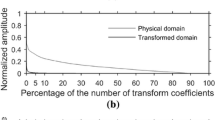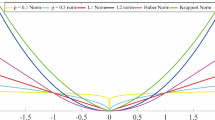Abstract
Full-waveform inversion (FWI) is a highly nonlinear and ill-posed inverse problem, which needs proper regularization to produce reliable results. Recently, sparsity and overcompleteness have been successfully applied to seismic data processing. In this study, we propose a novel adaptive sparsity-promoting regularization for FWI which combines the L-BFGS algorithm with an adaptive overcomplete dictionary learning method. The dictionary is learned from many small imaging patches taken from the optimal velocity model that is obtained by previous L-BFGS iterations. Our dictionary learning method tries to exploit the 2D geometric structure of the training patches in a more direct way and is simple to implement. We test our proposed method on a smoothed Marmousi model, a BG Compass model, and a SEG/EAGE salt model. Since total variation (TV) regularization plays an important role in FWI, the inversion results using the TV regularization method are also presented for comparison purposes. From these experiments, we conclude that the proposed method can achieve better performance than the FWI with the TV regularization method.







Similar content being viewed by others
References
Aghamiry, H. S., Gholami, A., & Operto, S. (2020a). Compound regularization of full-waveform inversion for imaging piecewise media. IEEE Transactions on Geoscience and Remote Sensing,58(2), 1192–1204.
Aghamiry, H. S., Gholami, A., & Operto, S. (2020). Full waveform inversion by proximal newton method using adaptive regularization. Geophysical Journal International,224(1), 169–80.
Aharon, M., Elad, M., & Bruckstein, A. (2006). The K-SVD: An algorithm for designing of ever complete dictionaries for sparse representation. IEEE Transactions on Signal Processing,54, 4311–4322.
Bao, C., Cai, J. F., & Ji, H. (2013). Fast sparsity-based orthogonal dictionary learning for image restoration. Proceedings of the 2013 IEEE International Conference on Computer Vision. https://doi.org/10.1109/ICCV.2013.420.
Bao, P., Zhou, J., & Zhang, Y. (2018). Few-view CT reconstruction with group-sparsity regularization: GSR-SART. International Journal for Numerical Methods in Biomedical Engineering. https://doi.org/10.1002/cnm.3101.
Beckouche, S., & Ma, J. (2014). Simultaneous dictionary learning and denoising for seismic data. Geophysics,79(3), A27–A31.
Bruckstein, A. M., Donoho, D. L., & Elad, M. (2009). From sparse solutions of systems of equations to sparse modeling of signals and images. SIAM Review,51(1), 34–81.
Byrd, R. H., Lu, P., & Nocedal, J. (1995). A limited memory algorithm for bound constrained optimization. SIAM Journal on Scientific Computing,16(5), 1190–1208.
Chan, T., Marquina, A., & Mulet, P. (2000). High-order total variation-based image restoration. SIAM Journal on Imaging Sciences,22(2), 503–516.
Chen, Y. (2017). Fast dictionary learning for noise attenuation of multidimensional seismic data. Geophysical Journal International,209(1), 21–31.
Donoho, D. L. (2006). For most large underdetermined systems of linear equations the minimal \(\ell _1\)-norm solution is also the sparsest solution. Communications on Pure and Applied Mathematics,59, 797–829.
Donoho, D. L., Tsaig, Y., Drori, I., & Starck, J. (2012). Sparse solution of underdetermined systems of linear equations by stagewise orthogonal matching pursuit. IEEE Transactions on Information Theory,58(2), 1094–1121.
Elad, M. (2010). Sparse and redundant representations: From theory to applications in signal and image processing. New York: Springer.
Esser, E., Guasch, L., Leeuwen, T. V., Aravkin, A. Y., & Herrmann, F. J. (2018). Total variation regularization strategies in full-waveform inversion. SIAM Journal on Imaging Sciences,11(1), 376–406.
Fu, H. S., Ma, M. Y., & Han, B. (2020). An accelerated proximal gradient algorithm for source-independent waveform inversion. Journal of Applied Geophysics,177, 104030.
Gao, K., & Huang, L. (2019). Acoustic-and elastic-waveform inversion with total generalized p-variation regularization. Geophysical Journal International,218(2), 933–957.
Huang, X., Liu, Y., & Wang, F. (2019). A robust full waveform inversion using dictionary learning. Seg Technical Program Expanded Abstracts. https://doi.org/10.1190/segam2019-3215989.1.
Huang, X., Eikrem, K. S., Jakobsen, M., & Nvdal, G. (2020). Bayesian full-waveform inversion in anisotropic elastic media using the iterated extended Kalman filter. Geophysics,85(4), C125–C139.
Kumar, R., Willemsen, B., Herrmann, F. J., et al. (2019). Enabling numerically exact local solver for waveform inversion low-rank approach. Computing Geosciences, 23, 829–847.
Lewicki, M. S., & Sejnowski, T. J. (2000). Learning overcomplete representations. Neural Computation,12(2), 337–365.
Li, D., & Harris, J. M. (2018). Full waveform inversion with nonlocal similarity and model-derivative domain adaptive sparsity-promoting regularization. Geophysical Journal International,34(4), 1841–1864.
Li, X., Aravkin, A. Y., Van Leeuwen, T., & Herrmann, F. J. (2012). Fast randomized full-waveform inversion with compressive sensing. Geophysics,77(3), A13–A17.
Liu, L., Plonka, G., & Ma, J. (2017). Seismic data interpolation and denoising by learning a tensor tight frame. Inverse Problems,33(10), 105011.
Liu, L., Ma, J., & Plonka, G. (2018). Sparse graph-regularized dictionary learning for suppressing random seismic noise. Geophysics,83(3), V215–V231.
Loris, I., Nolet, G., Daubechies, I., & Dahlen, F. A. (2007). Tomographic inversion using L1-norm regularization of wavelet coefficients. Geophysical Journal International,170(1), 359–370.
Mairal, J., Bach, F., & Ponce, J. (2014). Sparse modeling for image and vision processing. Foundations and Trends in Computer Graphics and Vision,8(2), 85–283.
Mallat, S., & Zhang, Z. (1993). Matching pursuits with time-frequency dictionaries. IEEE Transaction Signal Processing,41(12), 3397–3415.
Matharu, G., & Sacchi, M. (2019). A subsampled truncated-Newton method for multiparameter full-waveform inversion. Geophysics,84(3), R333–R340.
Nocedal, J., & Wright, S. (2006). Numerical optimization (2nd ed.). Berlin: Springer Science & Business Media.
Oh, J. W., Shin, Y., Alkhalifah, T., & Min, D. J. (2020). Multistage elastic full-waveform inversion for tilted transverse isotropic media. Geophysical Journal International,223(1), 57–76.
Plessix, R. E. (2006). A review of the adjoint-state method for computing the gradient of a functional with geophysical applications. Geophysical Journal International,167(2), 495–503.
Pratt, R. G., Shin, C., & Hick, G. J. (1998). Gauss–Newton and full Newton methods in frequency-space seismic waveform inversion. Geophysical Journal International,133(2), 341–362.
She, B., Wang, Y., Zhang, J., Wang, J., & Hu, G. (2019). AVO inversion with high-order total variation regularization. Journal of Applied Geophysics,161, 167–181.
Tarantola, A. (1984). Inversion of seismic reflection data in the acoustic approximation. Geophysics,49(8), 1259–1266.
Xue, Z., Zhu, H., & Fomel, S. (2017). Full-waveform inversion using seislet regularization. Geophysics,82(5), A43–A49.
Yong, P., Liao, W., Huang, J., & Li, Z. (2018). Total variation regularization for seismic waveform inversion using an adaptive primal dual hybrid gradient method. Inverse Problems,34(4), 045006.
Zeng, X., Bian, W., Liu, W., Shen, J., & Tao, D. (2015). Dictionary pair learning on Grassmann manifolds for image denoising. IEEE Transactions on Image Processing,24(11), 4556–4569.
Zhou, Y., Zhao, H. M., Shang, L., & Liu, T. (2014). Immune K-SVD algorithm for dictionary learning in speech denoising. Neurocomputing,137, 223–233.
Zhu, L., Liu, E., & Mcclellan, J. H. (2017). Sparse-promoting full-waveform inversion based on online orthonormal dictionary learning. Geophysics, 82(2), R87–R107.
Acknowledgements
The authors thank the editor and the anonymous referees for their valuable comments, suggestions, and support. This work is partially supported by the National Natural Science Foundation of China (Grant No. 41474102).
Author information
Authors and Affiliations
Corresponding author
Additional information
Publisher's Note
Springer Nature remains neutral with regard to jurisdictional claims in published maps and institutional affiliations.
Rights and permissions
About this article
Cite this article
Fu, H., Zhang, Y. & Li, X. Adaptive Overcomplete Dictionary Learning-Based Sparsity-Promoting Regularization for Full-Waveform Inversion. Pure Appl. Geophys. 178, 411–422 (2021). https://doi.org/10.1007/s00024-021-02662-w
Received:
Revised:
Accepted:
Published:
Issue Date:
DOI: https://doi.org/10.1007/s00024-021-02662-w




